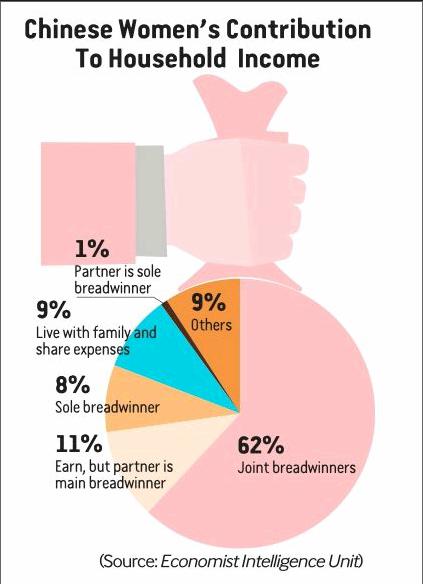The Power of The She-conomy
2015-01-29ByZhouXiaoyan
By+Zhou+Xiaoyan



Liu Ying, 28, is a website editor living in Beijing and has been a hardcore online shopper since 2008. Each year, she spends more than 20,000 yuan ($3,200) online on items including cosmetics, clothes and groceries.
“I prefer online shopping because its cheaper and more convenient, sometimes with discounts that you will never see in physical stores,” Liu told Beijing Review. “Also, in a big city as Beijing, it would take several hours to commute back and forth between my home and the shopping mall. Shopping online saves me a lot of time. Now, I only go to brick-and-mortar stores when I want to kill time.”
Online shopping doesnt just mean computers anymore, as Liu can use a variety of devices to shop ‘til she drops.
“I usually use mobile devices to browse those shopping sites, such as my cellphone and my iPad,” she said. “Shopping online has become so popular in China that even elderly people like my parents are frequent online shoppers.”
The whirlwind of online shopping has swept the nation with the worlds largest group of netizens, and female shoppers seem like a group that retailers cant afford to ignore. With rising independence and economic power, Chinese women control an increasing number of household purchasing decisions and show a passion for online shopping, according to the Report on Female Consumers in Asia by the Economist Intelligence Unit (EIU), an advisory company under the Economist Group.
Rise of female shoppers
On the rise and online—this is how EUI describes female consumers in Asia, especially women in China.
The report is based on a survey of 5,500 women across major cities on the Chinese mainland, in Hong Kong, Taiwan and Macao, as well as countries including India, Japan, Singapore and the South Korea.
Chinese women have the largest amount of independence in handling their finances, with 76 percent of them having their own bank accounts, much higher than other Asian areas surveyed.
“Women are controlling spending in a variety of categories where you would expect them to, such as clothing and accessories, cosmetics and groceries. But they also have an increasing influence in bigger ticket items such as electronics. Many brands are realizing this and making efforts to better understand what is important to female consumers,” said Laurel West, editor of the EIU report.
Nearly half of the women polled agreed that they preferred the experience of shopping online to doing so in brick-and-mortar stores. The preference for online shopping is more obvious among women from the Chinese mainland, with 69 percent of them claiming they prefer online to offline shopping, much higher than other regions such as Hong Kong, Singapore and Japan.
According to a report on Chinas e-commerce market from Bain & Co., a leading management consulting firm, online business-to-customer (B2C) retail will grow 25 percent annually in China, three times the growth rate of traditional retail industry.
Chinese consumers growing preference for online shopping is largely driven by the countrys efficient logistics system, online payment system and innovation as well as investment from heavyweight e-commerce players.
“China has a unique and powerful online payment system and infrastructure network, which is on par with that of developed markets. This paves the way for the development of e-commerce in China,” says the report.
Another interesting finding of the EIU report is that Chinese women dont seem to be living up to the stereotype of selfless and family-focused individuals.
Over 74 percent of women on the Chinese mainland are buying for themselves most of the time when shopping online. They do, however, engage in guilt shopping—67 percent of them said they would buy something for their partner, children or family when they feel they have bought too much for themselves.
The EIU report was commissioned by Vipshop Holdings Ltd., the largest online discount retailer for brands both in China and globally, as well as a leading female-oriented vertical e-commerce retailer in China.
“Women are a unique and important driving force in the Asian market. And at Vipshop, over 80 percent of the accumulative 90 million members are women, who contribute to 90 percent of our sales,” said Eric Shen, Chairman and CEO of Vipshop.
Yao Jianfang, an assistant analyst with China E-commerce Research Center, said his observations suggest women are more likely to be addicted to online shopping than men.
“They would sit in front of the computer browsing websites for hours. They wouldnt leave the desk even when their eyes are very sore. They couldnt help themselves but buying items that are on sale, even if they dont need them at all,” Yao said.
“Its especially true for single women. Some of them use online shopping as a substitute for a relationship and try to fill their empty emotional world with a wide variety of products.”
Overseas, mobile and social
Chinese women seem to have increasing preference for foreign products, with many seeing products from abroad as superior.
According to the EIU report, a growing number of Chinese women shop online specifically to get products from overseas, and 63 percent of Chinese women polled said they bought products from abroad because they were better than those produced domestically.
This perceived quality gap is partially a result of the safety problems that have plagued Chinas supply chain at regular intervals in recent years.
“Quality and trust are the fundamental issues (Chinese brands) face. If they want to be successful, they need to know how to grow beyond their own market. A lot of Chinese brands are well known on the Chinese mainland but not known in the global market,”said Linda Du, Shanghai managing director of communications and strategy firm APCO Worldwide. “That really limits their strength and power because consumers definitely want products that have a global reputation.”
Du said foreign brands that target Chinese women should know how to tell good stories behind the brands.
“English language skills of people from the Chinese mainland are much better than before. They travel around the globe and theyre more adapted to foreign culture, so if youre able to tell good stories, if they can learn stories from either global platforms or their friends and they buy into your brand stories … that will influence their purchasing decisions,” Du suggested.
Placing orders with mobile devices—smartphones and tablets—has become a general trend since the popularization of those devices in 2010, testifying that an economic force is taking shape in the mobile market.
The EIU report says the future of online shopping is mobile. Among all respondents, 58 percent of the youngest (18-29) demographic surveyed shop online with their smartphones at home, versus 38 percent of 40-49 years old. Women from the Chinese mainland are more active shoppers on mobile devices.
According to statistics from Analysys International, a leading business information provider in China, the value of transactions through mobile shopping in China totaled 210.32 billion yuan ($34.34 billion) in the third quarter of 2014, up 238.7 percent year on year. By now, the transactions have maintained a quarterly growth rate of more than 200 percent for seven consecutive quarters, surging 10 times within the past two years.
The EIU report also says women from the Chinese mainland see online shopping as a communal practice.
Elisabeth de Gramont, group account director of Jigsaw Communispace, a business consultancy, said brand knowledge is almost a form of social currency on the Chinese mainland.
“Chinese women view shopping in general as a social activity,” she said. “There is a very important social media element to online shopping, such as customer reviews and reviews of other like-minded women, because thats really what they trust most. Successful e-commerce websites should have a social component because women do like sharing with their friends, but also being able to have some sort of community or discussion about the product and what theyre buying brings a lot of quality assurance,” she suggested.
Liu Ying, the 28-year-old website editor, agreed, adding that communications about stuff bought online have become a daily ritual in her office.
“Every time anyone buys something online and the product is delivered to our company, we would surround the person and check the quality of the product,” she said. “If its good, we would ask for the link and all rush to buy it.”
